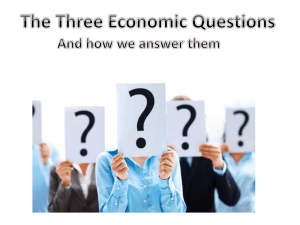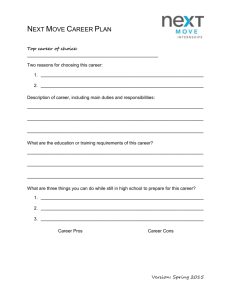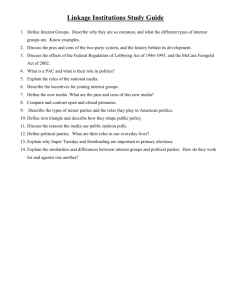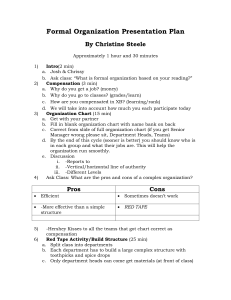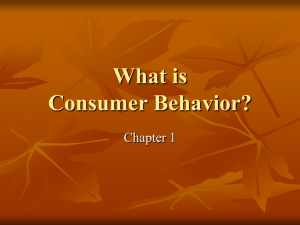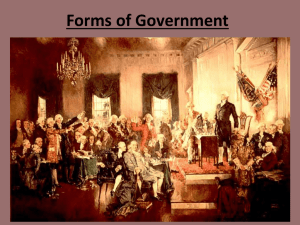forms of government - Bourbon County Schools
advertisement
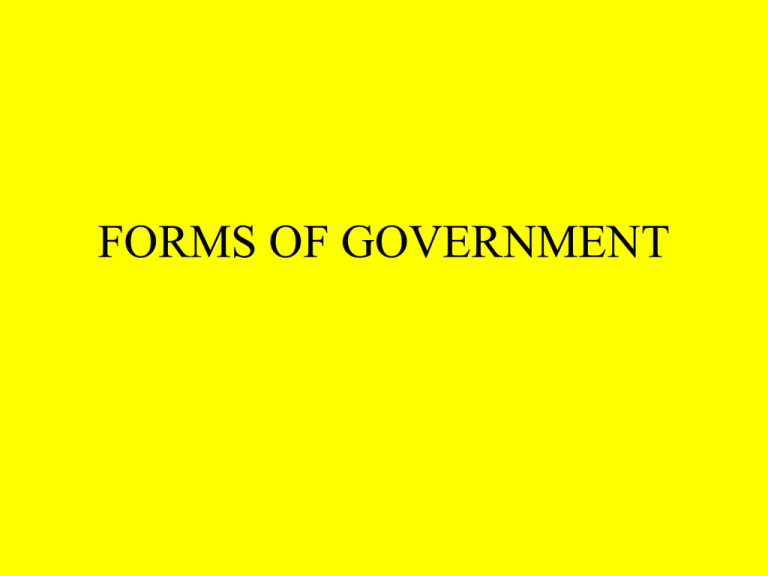
FORMS OF GOVERNMENT Forms of Government Type: Direct Democracy Def: government in which all citizens have equal power in decision making Pros: 1.) Every Citizen has equal power. 2.) Everyone is involved in decision making. 3.) Broad base of loyalty and support. Cons: 1.) Only works with small # of people. 2.) Time consuming – All citizens must give input and debate. • Example: Modern Day Switzerland Attempting Venezuela Type: Representative Democracy (Repbulic) Def: government in which people elect representatives who hold the decision making power. Pros: 1.) Citizens involved in decision making through representatives. 2.) Reps are aware their job depends on meeting the needs of their constituents. 3.) All elements of the population are represented. 4.) Reps are highly educated and can devote time to matters. • Cons: 1.) Decision making is time consuming. 2.) Desire of reps to please everyone can cripple system. 3.) Reps may not always agree with the people the represent 4.) Lack of citizenship involvement may allow special interest groups to influence or dominate reps • Examples America Australia Iraq Canada DOES DEMOCRACY REALLY EXIST? • “A true democracy has never existed and never will.” - Jean-Jacques Rousseau • Society has too many limits on people behavior to be truly free • Believed Community should be placed above indivudual freedoms. Forms of Government • Type: Dictatorship • Def: a country ruled by a single leader. The leader has not been elected • - In a military dictatorship the army is in control Pros: 1.) People united in loyalty to a dictator. 2.) No competition for trust and affection. 3.) React quickly in emergency,. Cons: 1.) People afforded little or no individual liberty. 2.) Policies suit dictators needs only. 3.) Decision making has a narrow base- • Examples Adolf Hitler – Nazi Germany Saddam Hussein – old Iraq • Fidel Castro-Cuba Died Dec. 2011 Kim Jong-il – North Korea. - Communist dictatorship Kim Jong-un - Currently threatening the world with nuclear weapons. Communist • In a communist country, the government owns property such as businesses and farms. • Provides its people's healthcare, education, and welfare. • Typically, communist governments end up with dictators. Forms of Government • Type: Autocracy • Def: single person having unlimited power; - can be a president, prime minister, or king,queen, or tsar. • Example Russian TsarsCatherine the Great Forms of Government Type: Oligarchy Def: power is in the hands of a few persons or a small group - have the combined power of a dictator. Pros: 1.) Decisions can be made relatively quickly. 2.) Provides expert leadership 3.) In theory, the most educated members of society. Cons: SAME AS DICTATORSHIP (Needs and wants of the people are not necessarily considered.) Pros: 1.) Can rule quickly in an emergency. 2.) efficient 3.) Total control 4.) intelligent Cons: 1.) Ignores others needs 2.) can be irrational 3.) no tie between leaders and doers 4.) use of force or threats. Examples: BCHS Principals - There are only 3 of them. - They are highly educated. - They meet to make important decisions Type: Theocracy Def: a religious group of officials that are in charge. - claim to rule on behalf of God of higher power. Pro’s: 1.) High morals 2.) High social welfare – wealthy Con’s : 1.) Rule with fear 2.) Not everyone has equal voice. 3.) Could be based on superstition 4.) No diversity. Example: CurrentIran Vatican- Pope Type: Monarchy Def: government ruled by a king or queen. - Position held for life. - Ruling position can be passed on to heirs. Absolute Monarchythe ruler has absolute (or total power) destined by God’s grace. * Very rare today. Constitutional Monarchya democratic government has the real power. Monarch’s power limited by constitution. Pros: 1.) consistent 2.) No political bickering 3.) Clear line of succession. Cons: 1.) dictatorship can be easily imposed. 2.) quality of hereditary 3.) difficult in modern world. Examples: Closest to an absolute Saudi Arabia Constitutional Monarch: England Type: Anarchy Def: no government - results after Civil War - Anarchists believe government is bad • • • • Pg. 94 Key terms – define 1-4 Due at end of class Capitalist • In a capitalist or free-market country, people can own their own businesses and property. People can also buy services for private use, such as healthcare. • Capitalism is not a true form of government, but is a form of economy that can only exist in a democracy. • But most capitalist governments also provide their own education, health and welfare services. These are not true capitalist societies, but mixed market. Revolutionary • If a government is overthrown by force, the new ruling group is sometimes called a revolutionary government. • Soon, the new government establishes itself as one of the main forms of government (or starts a brand new category)

